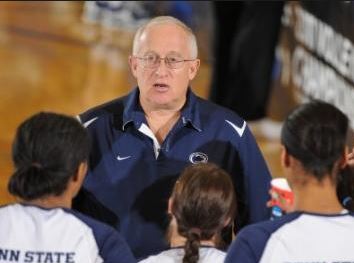A Conversation with Russ Rose
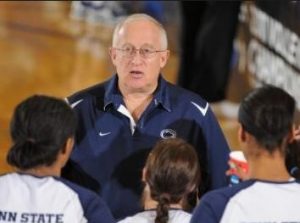
On June 17, 2016 we sat down with Coach Russ Rose, Head Coach of the Penn State Women’s Volleyball team since 1979, for a conversation about coaches and coaching, centering on three books: “When Pride Still Mattered: A Life of Vince Lombardi,” by David Maraniss, “Wooden on Leadership,” by John Wooden and Steve Jamison, and “Geno: In Pursuit of Perfection,” by Geno Auriemma with Jackie MacMullan.
We’ve divided the interview into five parts: I. The Difference Between Excellence and Success; II. How Do You Get to Carnegie (or Rec) Hall? III. The Cowboy’s Uncertainty Principle; IV. Getting (and Staying) On Top; and V. Fame.
We hope you enjoy reading the interview as much as we enjoyed our conversation with Coach Rose.
Part I: The Difference Between Excellence and Success
Tom Boswell, the great Washington Post columnist, wrote about the difference between excellence and success, in a February 6, 1986 column in the Washington Post:
Many people, particularly in sports, believe that success and excellence are the same. They’re not. . .. Success is tricky, perishable and often outside our control. Excellence is dependable, lasting, and largely an issue within our control; pursuit of excellence, in and for itself, is the best of foundations. . .. Success can burn up the person who achieves it. Excellence usually feeds whoever has it. . ..
Contrary to his reputation (“Winning isn’t everything, it’s the only thing” – a line that actually was first uttered in a 1930s movie, by an 11-year old actress), the difference between excellence and winning was important to Vince Lombardi:
Carroll Dale, a receiver who came to the Packers in 1965 from Los Angeles, said that it was “human nature, when you win, to overlook mistakes.” But Lombardi was different. “He would not overlook them. He would correct them, immediately. Winning wasn’t everything for him, he wanted excellence. There’s a difference.” When Pride Still Mattered, pg. 366-367 ebook.
John Wooden put it in slightly different terms, differentiating between winning and success, which he defined as “peace of mind which is a direct result of self-satisfaction in knowing you did the best of which you are capable.” He wrote:
I do not judge success based on championships; rather, I judge it on how close we came to realizing our potential. Wooden on Leadership, pg. 31 ebook.
DigNittany: What are your thoughts on the difference between “excellence” and “success”?
Coach Rose: From my standpoint, you have your team’s attention much more following a loss than you do coming off a victory. Players think “Why would my coach be concerned about performance?” when he or she is also referencing the importance of results.
Whether it’s pro sports, or college sports, or scholastic sports, there might be a process or a developmental phase when you’re going from point “A” to point “B,” where you can’t just say “Oh yeah, I just got the job. We’re going to win the State Championship!” Wooden’s early record wasn’t great (it wasn’t worthy of the acclaim he received later in his career). He actually wanted to return to the Midwest, as his wife didn’t really enjoy the West Coast – but the AD reminded him that it was he, Wooden, who wanted the three-year contract.
There’s a story in John Feinstein’s new book ”The Legends Club” – a very good book about North Carolina’s Dean Smith, Duke’s Mike Krzyzewski, and North Carolina State’s Jim Valvano – that Krzyzewski, who was coming off a tough season, thought he was potentially getting fired. Instead, when he went to the Athletic Director’s office, the AD gave him an extension and a raise. The best thing for Krzyzewski at that time was that the other two teams from Tobacco Road were playing in Regionals on the other side of the country, so all the media was covering them, and nobody was back home writing “Fire Coach Krzyzewski.”
So when we’re talking about excellence and success, “excellence” might be the goal we’re trying to achieve – we’re trying to clean up our ability to play the game at the highest level we possibly can. “Success” might be a perception or a feeling at the conclusion of a practice, an event, or a season, where the kids feel “successful” – maybe not because they performed at a certain level, but because the goal was to get through the practice, or the preseason. I’ve heard players say that getting through preseason is the goal. And I’m saying to myself “No one has ever died in our preseason. Why would that be what you’re latching onto?” Whereas, when you talk about Lombardi’s preseason, and Bill Parcells’, the players would say it was significantly harder than the games.
You want to know “Can my team compete at the highest level?” And in some cases, you can find that out by how hard they go right out of the gate. In some cases, you’re just never going to know. You can go slowly, and you can keep on waiting, and waiting, and say “I’m going to build, I’m going to keep building this great foundation,” and then the season ends and you never really know. What was their tipping point, and could I have gotten to the tipping point earlier to know “This is a team that although they stumbled here, they have the potential to be great somewhere else?”
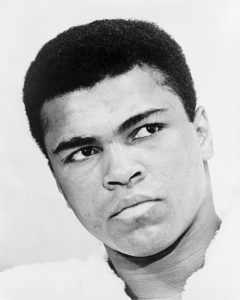
My big reading focus now is Muhammad Ali, because he just passed. One of his interesting quotes was “A man who views the world the same at fifty as he did at twenty has wasted thirty years of his life.”
So in coaching, it’s the same thing, whether we’re talking about pro coaches or college coaches, you have to look at your situation.
Are you at the end of a contract as a coach? If you are, then you might be more concerned about not rocking the boat. You might want to have a successful season, and define success as the players being happy, and the players and their parents not wanting to have you fired.
Whereas the administration might say to you “We’re paying you an awful lot of money, and frankly, we’re not comfortable with the results we’re getting. So we’re going to go in a different direction, and we’re going to pay you the balance of your salary.”
Or they might say “We want you to make a change in your staff,” which is what some schools do in football or basketball situations. Now in my mind, if the staff has been loyal, and the coach doesn’t think they’re the problem, a coach with backbone and loyalty and principles would say “No way. If they go, I go.”
Certainly, a lot of professional coaches deal with owners who really don’t have a high sport background; maybe they have a great business background. That’s not to say you can’t come from a great business background and be a very successful sports owner, but you’d like to think that the people who are determining whether or not you keep your job have relevant experience.
So when I look at excellence and success, it’s tricky. If I have two different players sitting in two different chairs, it may be that both of them have the chance to be successful players, but only one of them has the potential to be an excellent player. Maybe the physical attributes of one don’t allow them to be an excellent player, but that player will find other ways to be helpful to the team.
Thursday night in game six of the NBA Finals, a guy who the Cavaliers picked up for a minimum contract seemed to be one of the key players for Cleveland. It’s not as though Cleveland just found him on the street somewhere and said “We need a guy who cares.” They all care. But here was a guy who had experience, and when given an opportunity, he was ready to do his thing.
When you’re talking to players, so many times they’re not ready to perform like that. Coaches can talk to them; they can print quotes and put them on their walls or hand them out to their players. I’m not thinking quotes are winning games.
DigNittany: In a recent interview, when asked what was the one trait he thought was most important in a young player, Ron Hextall, the General Manager of the Philadelphia Flyers, said if he had to choose one word, it would be “will.” Your thoughts?
Coach Rose: You can win some matches with “will” over “skill,” but I don’t know that you can win that way throughout a whole season. I just read a book “Grit: The Power of Passion and Perseverance,” by Angela Duckworth. Terrific read. She did a really good job breaking it down.
I think there’s a lot of ways to measure excellence and success. If we’re just looking at the results, and we’re looking at the outcome events, that’s one of the ways one can keep score. It’s not the only way. One might say “I’m developing character. And it was a successful year because my players bonded and we made great progress.” And that’s terrific, unless the expectation is for you to win the championship.
[Editor’s Note: Duckworth’s TED talk (see below) has been viewed 8,670,000 times. The New York Times wrote that if “Grit: The Power of Passion and Perseverance,” were a Power Point presentation, “the best slide would be the two equations that offer a simple proof for why grit trumps talent: Talent × effort = skill. Skill × effort = achievement. In other words, “Effort counts twice.”]
Part II: How Do You Get to Carnegie (or Rec) Hall?


The conductor of the New York Philharmonic was racing up New York’s Seventh Avenue to a rehearsal, when a stranger stopped him. “Pardon me,” he said, “can you tell me how to get to Carnegie Hall?” “Yes,” answered the conductor. “Practice! Practice!”
Minor details – like pennies – add up. A good banker isn’t careless with pennies; a good leader isn’t sloppy about details. . .. Just as there is a correct way to tie your sneakers, there is a correct way of executing virtually everything in the game of basketball. Wooden on Leadership, pg. 155; 161 ebook.
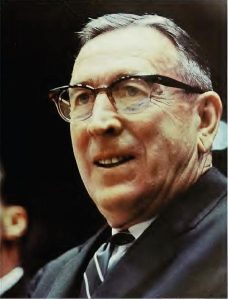
DigNittany: John Wooden was a stickler for detail (today’s world might call him a fanatic). He said there was a correct way to do everything in basketball, and he went so far as to start his season practices with an explanation on how to put on your socks and tie your sneakers. He also was known for not showing emotion — a commentator once said “Wooden just raised an eyebrow; he must be really upset.” But the first two building blocks of his “pyramid of success” were “industriousness” and “enthusiasm.”
Lombardi believed that “doing the same thing over and over again, whether it was a play or a calisthenic,” would make his players “fearless and instinctive.” But “passion” was also part of his trinity of football success.
Your thoughts on practice, Lombardi’s passion, Wooden’s details, and “building blocks” for excellence?
Coach Rose: Well, Wooden was doing that back then. You wonder if he would do that now. Thinking about repetition, in Outliers, Malcolm Gladwell talks about the 10,000-hour rule. But in college athletics, you can’t make 10,000 hours on 20 hours per week.

Everybody practices hard, but everybody practices differently. Wooden made his players run the same plays over and over again. They say that the practices run by Al Scates, the former head coach of the UCLA men’s volleyball team, were pretty similar for years and years, and no volleyball program has generated more national championships. So, would it be the program? Would it be the practices? Would it be Al’s steady hand? Would it be the recruiting? I would say “yes” to all of those things, because all of them contribute.
Some coaches are 100 percent about technique. I would be more along the lines of “I want the players to compete.” I want to see competitive behavior and I want to see group cohesion behavior, instead of saying technique training is the most important thing or only thing. Again, I think there are a lot of ways to practice, prepare, and compete.
DigNittany: By “group cohesion” do you mean the players have an on-court awareness of each other and what each player is doing?
Coach Rose: Part of group cohesion is that they monitor each other. Every team – whether it’s the Golden State Warriors, where maybe one or two of their players are more likely to get in trouble and get thrown out of games, or a football team, or a college basketball team – has players that for one reason or another need monitoring.
For example, if I were to ask my players to list which three players are most likely to forget their shoes, forget their uniform, or sleep through practice, and everyone lists the same three players, then the players know. I’m not going to take it out on those three players because they’re absent-minded or forgetful, because everyone else on the team knows those players are like that. They should help monitor those people. It shouldn’t be the coach punishing them for forgetting, because we all know they’re going to forget. It’s the other players who should be reminding them, or addressing whatever the issue is.
DigNittany: One thing that stood out in the Lombardi book was that he concluded early on that he had to pace his coaching to the level of the slowest learning player. Has your experience been similar coaching volleyball?
Coach Rose: My thought is that if you have to tell someone the same thing a number of times, at some point in time, they will convince me that they’re not going to be able to do it. Then, I’m better off finding another person to talk to, because you can’t keep on telling a player the same thing, and have them keep on failing. Maybe they don’t understand, maybe they’re afraid – I don’t know what the answer is – but I know that for me, I’d rather tell the same thing to a new face, than the same thing to the same face, over and over again.
With Lombardi, it was “We’re going to run this play, you’re going to know we’re going to run this play, and you can’t stop us when we run this play.” Football coaches will say “Every play is a touchdown play if everyone does their part and the chips fall where they’re supposed to fall.” I’m sure basketball coaches would say the same thing.
Now, how do we translate that to volleyball? Repetition for volleyball has to be with an awareness of error control. The teams that are winning the most are making the least amount of errors. The question is, are they making the least amount of errors because their system is simplified, and they’re not caught up on the flavor-of-the-month, or because they’re doing things the way the National team did them, or the way whoever wins the Gold Medal this summer did them? Or is it because their players are seniors or they have veteran players? Or is it because their coaches have the best handle on controlling their team?
DigNittany: What is an example of a coach being able to control their team?
Coach Rose: When a coach has control of their team, the coach talks to the group and the group listens collectively. A coach that is in control of his or her team can say to the setter “Stop setting player X because she’s making a lot of mistakes. I know she’s your best hitter, but she’s also the other team’s leading scorer right now, because she’s having a difficult day. I’m not taking her out, because we need her for passing, blocking, defensive reasons. But it would be helpful if you didn’t set her at the level you’re accustomed to setting her, because it’s not working today.”
Because that coach has control of their team, that one-day adjustment won’t adversely impact the setter, or the hitter, or the rest of the team, the next day. Whereas if a coach who doesn’t have control says that, the hitter goes home and says “The coach said never to set me again.”
DigNittany: So what are your thoughts about “building blocks” for excellence?
Coach Rose: I think detail matters, but if we have three different but successful coaches, one’s approach to detail could be that technique has to be perfect, the second one might believe that concentration and visualization are the most important things, and the third coach might say it’s all about communication and collective effort.
DigNittany: Coach Auriemma says in his book that he’s noticed that the top programs in sports, like the Carolina basketball teams, are “uniform across the board.” So there are no names on the back of the uniforms, all the players wear socks that are all the same length. He says he doesn’t want players to express themselves individually, other than on the court.
Coach Rose: We practice in matching uniforms, but it is facilitated by a corporate sponsorship and I like the look of practice. But I was struck by something watching the men’s volleyball Final Four this year, which Penn State hosted. I’m watching the teams practice. You’re supposed to wear matching uniforms. I’m watching one of the teams and they had five different shirts on – short sleeve, tank tops, long sleeve, different colors. And in the men’s game, the coaches would say “Who cares?” For the women’s NCAA tournament, there are a lot of rules about what you can and can’t do.
For me, it’s still about the players. I don’t care if a player wears a short sleeve or a long sleeve shirt; I care that she’s ready to play. I’m a lot looser in my practice, although I don’t prefer it if the older players are wearing shirts from previous seasons, and the newer kids don’t have those shirts.
I had a player go to a USA team, and she went to a practice, and she hadn’t been given the right practice jersey because the equipment people didn’t have enough of the matching jerseys. The coach made her run at the start of every practice, assuming she was being difficult. But if they had asked her “Why don’t you have the right jersey?” the answer would have been “This is what they gave me.” But she was tough and she was a great Penn Stater, and so she thought “OK, I’ll run. That’s fine.”
So what are these specific building blocks for excellence? You have to have good fundamentals. I think you have to have a good culture – which is interesting, because what was the culture of the Green Bay Packers? Some would say it was about that great line about Lombardi by the late Henry Jordan, ”He treats us all the same — like dogs.”
DigNittany: Though Jerry Kramer has written that Lombardi’s genius was that he treated all the players differently.
Coach Rose: Some of them, they loved him. There were some who didn’t like him, and there were some guys, like Jerry Kramer, who were going to sneak out every night anyway.
So our culture is that everybody is different, just like all Lombardi’s “dogs” were different. If anybody’s worked with horses, all the horses are different.
DigNittany: So that’s part of what you mean when you say that it’s really important to you, as a coach, to develop “character in characters”?
Coach Rose: I want coaching to be enjoyable for me. The players have a luxury of being in a pack. I’m not in the pack. So I have 22 one-on-one relationships. I still am responsible for the team and certain behaviors, but I don’t talk to them all the same way. When Lima [Associate Head Coach Salima Rockwell] played, I talked to Lima almost exclusively, because she was so enjoyable for me to talk to.
Some players over the years I chose to limit our interaction because I found it to be a wasted effort. Sometimes I’ll assign someone else to talk to them – not because I think they’ll have a better chance of reaching them. It’s because I’ve already moved on from the fact that the person doesn’t listen. In pro sports, they just get rid of that player.
So everybody has a different culture. For us, some years it’s better than others. Some years it monitors itself, and some years it’s almost as if you never had one. Your job is to make things better, but you may not be able fix what needs to be fixed.
Certain coaches worry about certain things. I only worry about the things I can control. So if I’ve got a kid who’s ADD, she’s ADD. I can’t change that. I also have to realize I can’t get rattled about it. But I do have the power to decide whether she’s going to be in the game at the end of the game, or not. So I can say to her “Hey listen, we need to have you be able to focus on these things to be in the game at the end of the game — to give the team a chance to succeed.” It’s crazy when the coaches and the bench are holding their breath.
Part III: The Cowboy’s Uncertainty Principle
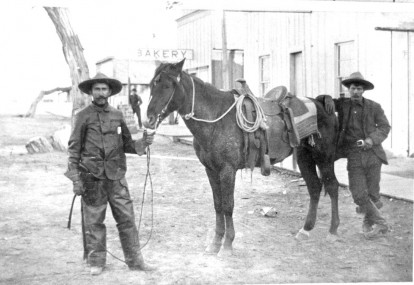
A cowboy hitches his horse outside the local saloon, goes in, and orders a cold mug of beer. When he’s finished drinking it, he goes back outside, but his faithful horse is nowhere to be seen. The cowboy stomps back into the bar, slams his fists on the counter, and yells, “Somebody in here took my horse. Now, I’m going to order another cold mug of beer. When I’m through drinking it, I’m going to walk back outside. I would strongly suggest whoever took my horse bring it back and hitch it to the hitching post. Otherwise, I’m gonna do what I did down in Texas – exactly the same thing as I did down in Texas.”
The cowboy orders another mug of beer, drinks it, and walks outside. Sure enough, his horse is at the hitching post. As he prepares to ride away, the bartender comes running out and asks, “Say, fella, that was very impressive. But I’ve got to ask ya, what did you do down in Texas when they took your horse?”
The cowboy looks down at the bartender and says, “I walked home.” Wooden On Leadership. pgs. 188-191, ebook.
DigNittany: John Wooden, whose book includes the Cowboy story, wrote that “Over the years, I changed from having lots of rules and few suggestions to lots of suggestions and fewer rules. To a large degree, I replaced specific rules and penalties with strong suggestions and unspecified consequences.”
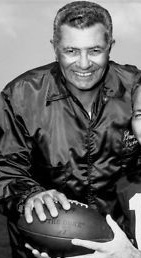
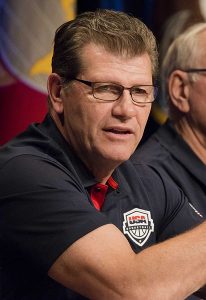
Vince Lombardi is said to have used fear to make sure that his players never felt too comfortable: “When they thought he was going to raise hell, he might, but often didn’t. When they thought he’d be pleased, he’d raise hell.”
Auriemma writes that “I bother my best players. I poke and I prod and I push and I cajole and I irritate, because I want to find out, right from the opening day, how they are going to react under stress. They are going to have to handle the most stress of anyone on the team.”
How would you describe your approach to team discipline, rules, and Wooden’s, and Lombardi’s and Auriemma’s versions of the Cowboy’s uncertainty principle?
Coach Rose: Wooden did have some rules. When Bill Walton wouldn’t cut his hair, he said – and I may not have the exact verbiage he used – “Bill, I’m really impressed by you standing by your principles and we are going to miss you.” How important is long hair versus short hair? For him it was the principle.
We don’t have a lot of rules. I’m a big believer that I’m not going to penalize the team because a player is a knucklehead. The penalty will come into play later, when there’s something they want to do – like work at a volleyball camp, and be with their team, and get paid for their work, and I won’t let them do it.
But it’s a different era now. The rules Wooden had then he might not have now.
Do I think keeping players off-balance like Lombardi did can be effective for college athletes? I teach an ethics class. When I had football players in the class – and there were 120 players on the football team – I’d say “Does the coach know your name? Does he really know who you are? Does he know your parents?” For some, the head coach knew everything. For some, they stayed on the periphery and their position coach was the person they most interacted with on a daily basis. Some were just happy to be on the team.
When we were in the midst of our run 109 consecutive wins from 2007 to 2010, obviously we were very good, there was never any reason to keep people off-balance. The goal was still to get better. The goal was to set the bar at a certain level of play, so that others had to take chances to beat us. So how would success be determined? For some people, success wouldn’t have been demonstrated unless we won the national championship. And there’s a small cadre of coaches in women’s college volleyball who understand that statement because they’ve had to live that statement.
And yet, to go back to the NBA analogy, if you were to say to all the players “If you could play one game, the last game of the season, even if it’s on the opponent’s home court, would you sign up for that Game 7 on the road?” They’d all say yes, because they’d think they’re going to score 30 points and they could win that game.
When we were in the midst of that winning streak, I never talked to the players about how many wins we had in a row, because it wasn’t relevant. What was relevant was the notes that I had from the last match on what we needed to do to get better. Some players I didn’t need to tell anything about what they needed to do to get better – they knew. Other players I did. Everybody’s different.
I might talk to some players about some things because they have the ability to shoot for the moon. So was I tougher on some of the players that are competing this year for spots on the Olympic team? Probably. But did I ever say anything hard to Christa Harmotto? Probably not, because she was the nicest teammate and young person in the gym, and she cared about the team, and she always worked hard.
I may not push the best player; I may push a player to push other players. So my control may not be with the player who needs prodding, it may be with her teammates. I might go to a player and say “Today it’s your job to get on her, not mine.” I always say to parents who are hard on their kids “Hey, you can’t be like that. It’s OK if they’re mad at me, but they always have to be able to come home to you.”
I’ll never go through a parent to get a subliminal message to a player. But there’s not really a lot of subliminal stuff with me, because I’m direct. When a player comes into my office, I’ll want them to tell me what they’re doing to become a better volleyball player. Tell me what it is. I’ll either say “Good, you’re doing the right thing,” or I’ll shake my head and say “Do you believe you’re doing those things or are you just saying those things?”
So the question is, are you looking for a fight? Some coaches may be looking to push buttons all the time, but in my mind, for some people there’s no reason to push buttons. There’s no reason to push a player’s buttons when that player is already doing everything that you want them to do, or going as close to their max as they possibly can.
There’s a saying in coaching that you’ve got a third of the players who like you, a third who don’t like you, and it’s the third in the middle who are going to get you fired if they go to the wrong side.
Part IV: Getting (and Staying) on Top

“In the profession of coaching, there are two essential challenges. One is to build a winning team from scratch, the other is to sustain excellence after a club has reached the top. They are distinct tasks, perhaps equally difficult, but usually requiring different intellectual and psychological skills. Even the best coaches are inherently more proficient at one than the other.”
When Pride Still Mattered, pg. 366-367 ebook.
DigNittany: With six NCAA championships in the last nine years, you’ve clearly reached a very high level building winning teams, and have experienced great success in sustaining excellence. Your thoughts on the challenges of building a winning program and of sustaining excellence.
Coach Rose: It was hard to build a program here because of our location, because we weren’t in a hotbed for volleyball. So we had to find what worked for us.
When I first got into coaching I thought “It must be so easy to coach all the best players. Those coaches with the best players, they don’t know how it is to have bad players.” Now, when I’ve had years when we’ve had really good players, my answer is that when you have really good players, you have a whole different set of factors that you have to worry about. When you only have one or two good players, you hope they stay healthy, you hope the team can win on their performance. But when you’ve got a roster of 12 or 14 really good players, roster management becomes hard. It would be a good problem to have and a few teams right now have that challenge.
Geno certainly has had great success at Connecticut. But it’s still hard to win even if you’ve got the best players. He’s had a really, really good run. Maybe next year they won’t be the favorite, but that doesn’t mean they can’t win. Somebody else might get picked to win it, but don’t think for a second Geno doesn’t think they’re going to win it. He’ll train to win it. Whether or not they will, I don’t know.
I think Anson Dorrance at UNC has really figured it out over the course of his career. He has written a few books and I think they are filled with great information.
I’m a big believer in just telling the truth – there’s no reason to do anything other than to tell the players my opinion based on the knowledge that I have. I don’t think that there’s any benefit for me to blow smoke. I tell my players I want to win, so it removes some of the b.s. where they think I’m going to play them because they’re a senior or a junior. I’m going to play the best players. But I’m not going to tell a kid “Give me your scholarship, because I’m going to bring in somebody better.” That’s not, in my opinion, how you treat people.
I’ve never said to a player “Hey, we need to beat this team because their coach said that you’re a so-and-so.” I’m not into psychological warfare. I’m into saying “Hey listen, do the best you can. This is what we’re going to do. And if it doesn’t work, you shake the opponents’ hands, and you say the right things, and we move on.”
Each year I know, after I get a realistic look at our roster, whether I’m confident that we really have a chance to win [the NCAA title] or whether we’ll have to get lucky to win it. Sometimes you have to get lucky to win it. You don’t always have to have the best team.
Not every one of my seven best teams won an NCAA Championship, because to me, my best team may have been the team that was closest to reaching their potential – which relates to the “excellence versus success” concept. There were some years we were really happy to get to the Final Four. One year we were undefeated and we lost to Nebraska on the road, and we came back the next year and they’re undefeated and we beat Nebraska. The team that lost was better than the team that won, in my opinion.
It was a combination of factors that enabled us to have our run. We had a good staff, but you can’t do it without the players. We had great players, as demonstrated by the fact that there was one year where all six of them made All American. That’s not to say we had all the best players.
For example, Stanford had Foluke Akinwadero and we had Ari Wilson. Foluke has gone on to have the better career, but Ari led the nation in hitting [Editor’s note: with a record-breaking .540 attack percentage.] For what we needed, Ari Wilson was great. Right now, Foluke and Christa [Christa Harmotto Dietzen] are competing to become the starting middles on the 2016 U.S. Olympic team, after starting in 2012.
I think all volleyball coaches would say the same thing: it’s a team game. You could be really good as a group, and in volleyball, that’s really a major factor. And players and teams can get hot. In a one-and-done tournament like the NCAA Volleyball tournament, that can also be a factor.
DigNittany: What are some of the things you’ve learned over the years that have helped you prepare your players for success and how to respond to failure?
Coach Rose: When you win four NCAA volleyball championships in a row, there aren’t any players in college volleyball who have won a volleyball national championship other than your players. Your players are the only ones who have experience getting there and winning there. It’s a different skill set.
I’ve learned, as Joe Paterno used to say, you’re not as good as you think you are when you win, and you’re not as bad as you think you are when you lose. And I would also say you’re not as important as you think you are when you win, and you’re not as insignificant when you lose. I’ve learned you have way more opportunities to show class in losing than you do in winning.
I’m embarrassed when I sit through introductions at speaking engagements and they focus on my successes, as if I did it, but it’s not the case because I’m not the players, I’m not the entire staff, I’m not the university that funded it. I have a role, and I think I do a good job in my role, and I understand the importance of coaching. But I also think maybe some of the greatest things coaches do are in developing character, and not always being the winning coach speaking at the conclusion of the championships. Sometimes the best thing a coach can do is get out of the way.
What do I care about? I care about when one of my players comes back to town, and her daughter says “let’s do breakfast tomorrow morning” [Editor’s Note: This happened during the interview.] Our players come back all the time and they always come into this office.
DigNittany: John Wooden wrote:
For those many coaches whom I respect and have warm feelings toward, I would wish each one a national championship. For those few coaches for whom I have less-than-warm feelings, my wish would be that they win many national championships. However, in truth, I’m not sure I would wish that on anybody.
After winning an NFL Championship, Lombardi wrote to his players that he believed they now realized “that success is much more difficult to live with than failure.”
Taken together, these quotes remind us of the Chinese curse “May you live in interesting times.” Your thoughts?
Coach Rose: I love the Wooden quote. He says that because he knew how hard it is to carry other people’s expectations. And every year it’s a heavier weight that you somehow have to carry.
DigNittany: Focusing on your 2007 to 2010 NCAA Championship run, did your players feel the pressure of expectations?
Coach Rose: If you give that weight to your team, I think it bogs them down. I don’t think a team can carry it all. I was able to get them to believe “This is what’s important about what’s going on, not what other people are saying or thinking.” So people in the media were mad because I didn’t always make my players accessible. We don’t always announce when we’ve signed recruits, and we don’t announce when somebody gets hurt, because that’s not what we do. I care about the team and not the total access that some desire.
We’ve tried to build a program where in years when we have the chance to compete at the highest level, we’re going to try to compete at the highest level. And in other years, we’re going to try to “steal” a couple of games and points in matches when we can.
Every team is different. You graduate a player; you add a player. The Packers weren’t the same every year. People retire. Somebody’s gone. Even if you bring in somebody better, it doesn’t mean the product’s going to be better, it doesn’t mean that the commitment is going to be better. Because it’s possible that all those other players played better for that one player who’s no longer on the team.
Unfortunately, we’re in a world of “What have you done for me lately.” That’s why the “sustaining” thing is so hard.
Part V: Fame
My idea of heaven is to be a rock and roll star and be totally anonymous – no one ever sees you.
Keith Richards, quoted from Netflix Original: “Keith Richards – Under the Influence.”
DigNittany: Do you think Keith Richards is on to something?
Coach Rose: I enjoy going places where nobody knows me. Here’s my thought: Rock stars want to be athletes; athletes want to be rock stars.
DigNittany: We’re neither, so we appreciate you taking the time to speak with us. Thanks so much.
_____________________________________
Credits
- Russ Rose photo courtesy of GoPSUsports.com
- John Wooden photo by Associated Students of the University of California at Los Angeles (1972 Southern Campus (UCLA yearbook), p.77) [Public domain], via Wikimedia Commons
- Bust photographic portrait of Muhammad Ali in 1967. This work is from the New York World-Telegram and Sun collection at the Library of Congress. According to the library, there are no known copyright restrictions on the use of this work.
- Carnegie Hall photo by Rodney (Carnegie Hall Uploaded by Marcus Cyron) [CC BY 2.0 (http://creativecommons.org/licenses/by/2.0)], via Wikimedia Commons
- Rec Hall photo by Steve Manuel, courtesy of GoPSUsports.com
- Al Scates, former volleyball coach for UCLA, by Jack Rosenfeld. This file is licensed under the Creative Commons Attribution 2.0 Generic license.
- Photograph of two employees of the Aztec Land & Cattle Company (the Hashknife outfit) standing with a horse in Holbrook, Arizona. Circa 1900, via Wikimedia Commons
- Vince Lombardi photo, see page for author [Public domain], via Wikimedia Commons
- Geno Auriemma photo, by Chairman of the Joint Chiefs of Staff (Flickr: 140507-D-HU462-423) [CC BY 2.0 (http://creativecommons.org/licenses/by/2.0) or Public domain], via Wikimedia Commons
- Mississippi Sheiks “Sittin’ on Top of the World,” John Tefteller’s Museum 78’s, This file is made available under the Creative Commons CC0 1.0 Universal Public Domain Dedication.
